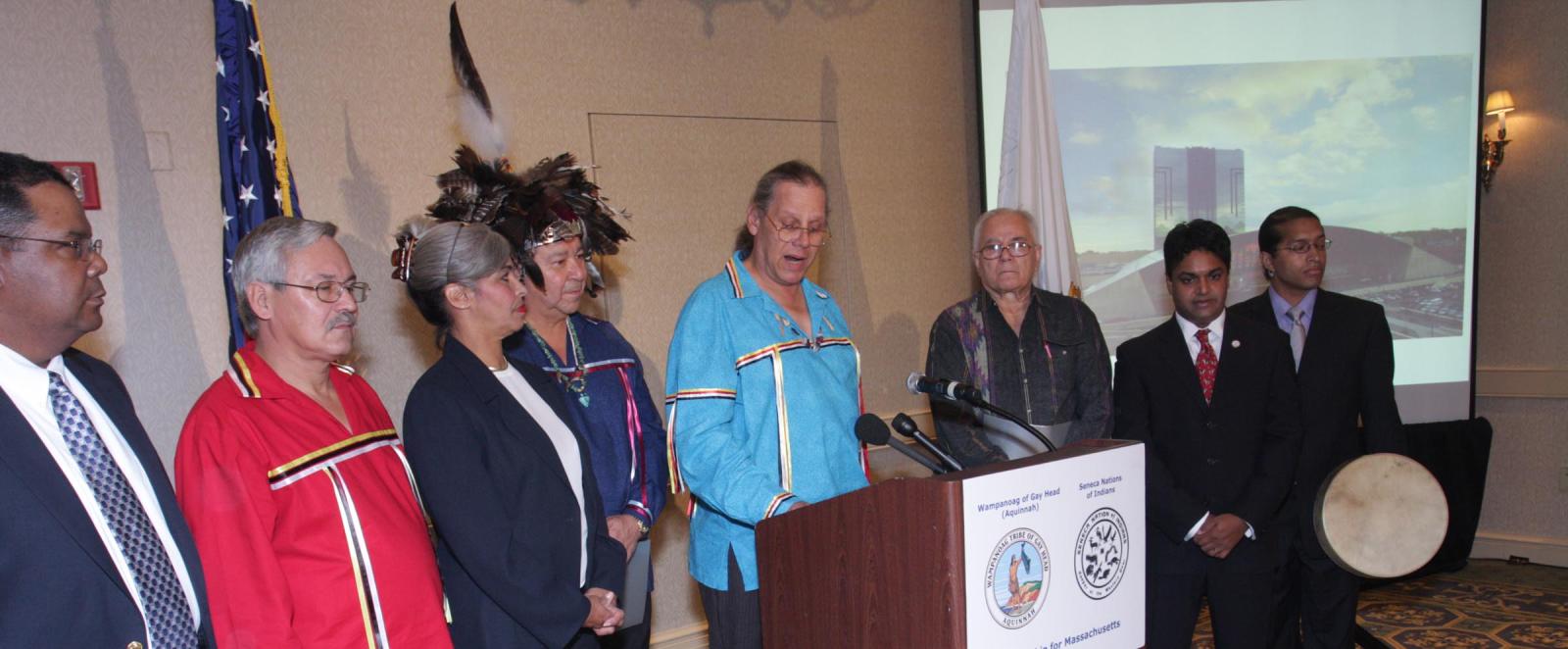BOSTON — The Wampanoag Tribe of Gay Head (Aquinnah) publicly stepped back into the casino game this week, as tribal leaders formally announced that they have formed a business partnership with Seneca Nation, an upstate New York tribe that owns and operates three successful casinos.
Aquinnah Wampanoag tribal chairman Donald Widdiss announced the partnership at a press conference at the Omni Parker House in Boston late Wednesday morning, although news of the partnership had been reported in the regional print press early this month.
The Wednesday morning press event was attended by Seneca tribal leaders, executives of Seneca Gaming Corp. and Wampanoag tribal council members.
The press conference provided no details about the partnership or its project plans.
The 7,600-member Seneca Nation has built three profitable casinos in upstate New York in five years and has other businesses as well. The tribe reportedly has $1.2 billion in revenue from its casinos and other businesses. The casinos are located in Niagara Falls, Salamanca in Erie County and in Buffalo, N.Y.
The new partnership hopes to compete for one of three potential Massachusetts casino licenses that Gov. Deval Patrick wants to put out to bid in a proposal he unveiled last month to bring casinos to the commonwealth. Set to be taken up by the Massachusetts legislature in January or February, Governor Patrick’s casino plan faces an uphill battle there. Among other things House Speaker Salvatore F. DiMasi opposes casinos.
The Wampanoags are also facing competition from Mashpee Wampanoags and The Mohegan Tribe, which operates a casino in eastern Connecticut near the Rhode Island border, as well as with other casino companies. Governor Patrick has proposed one casino for the Boston area, another in southeastern Massachusetts and a third in western Massachusetts.
The Aquinnah Wampanoags have set their sights on western Massachusetts, although Mr. Widdiss said on Wednesday that the tribe would prefer to be in southeastern Massachusetts, where the Mashpee Wampanoag tribe has reached agreement with the town of Middleboro for a casino. He said the tribe has a handshake agreement with Northeast Properties which owns 150 acres in Palmer and is currently seen as a site for a western Massachusetts casino license.
“We’d prefer the southeastern site obviously, it’s close to where many of our people live and work, but we will pursue any of the sites selected,” Mr. Widdiss said. New Bedford is also a candidate for a casino resort complex.
“I don’t believe the governor is trying or wants to put the tribes in competition with each other,” Mr. Widdiss said. Governor Patrick has said that any casino licensing would include a strong Native American component. If casinos are approved, it is expected that Native Americans will be involved. If not, the two Massachusetts tribes could pursue a casino under the Indian Gaming Rights Act.
Mr. Widdiss said the Seneca Nation’s reputation for building quality gaming, hotel and entertainment venues quickly and in competitive markets should be attractive to state officials and to the governor. “If we read this correctly, the governor wants to move quickly and it’s nice to know that the Seneca nation moves expeditiously,” he said. Seneca Nation is currently building a $333 million casino resort on the Buffalo city waterfront.
Answering questions about the ability of Massachusetts casinos to compete with nearby casinos in Connecticut, Mr. Widdiss said: “The Seneca Niagara Falls Casino competes very successfully with Canadian casinos just across the falls.”
The Aquinnah and Mashpee Wampanoags, which are separate, are the only two federally recognized tribes in the commonwealth.
The Aquinnah Wampanoags tried without success in the 1990s to pursue a gaming and casino license in Massachusetts — at great cost to the tribe, both politically and financially. “That didn’t work for us and it won’t work now. This is a business proposition.” Mr. Widdiss said on Wednesday.
Asked about financing, Mr. Widdiss said: “The money is not a problem. The issue is understanding just what the opportunity is going to be.”







Comments
Comment policy »